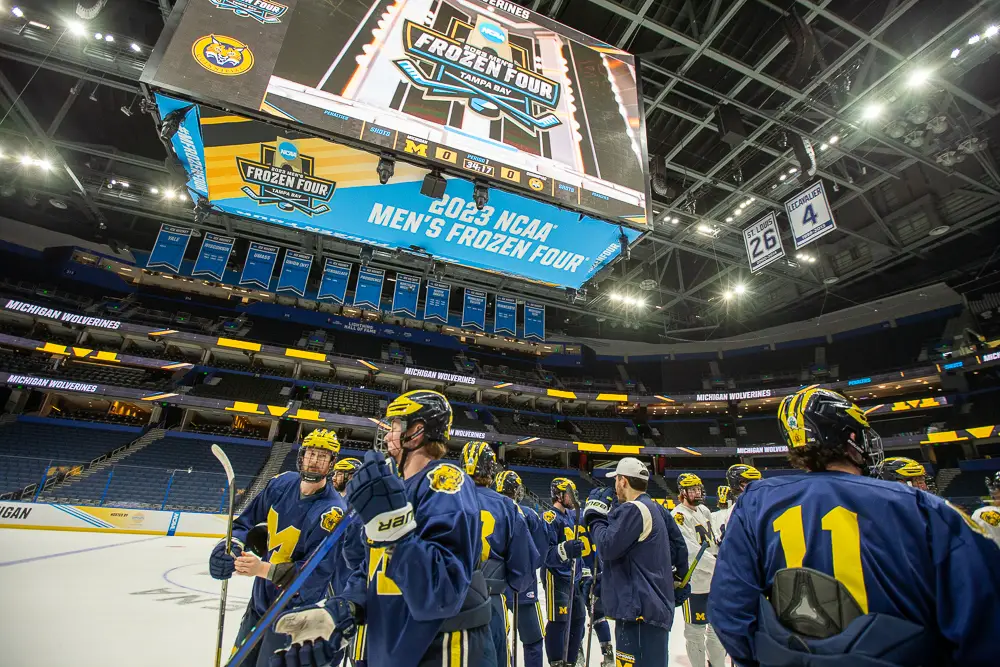
TAMPA, Fla. — Any two teams that play their way into the Frozen Four are bound to have much in common. For example, when Quinnipiac meets Michigan in Thursday’s second semifinal game, fans will be treated to a match between two of college hockey’s highest-scoring teams.
Averaging 3.95 goals per game, Quinnipiac has the third-best offense in the country. Michigan’s offensive output is tops, scoring 4.21 goals per game on average.
At the opposite end of the ice, however, there are some stark differences that separate the Bobcats from the Wolverines. One is in net. Quinnipiac’s Yaniv Perets, a finalist for this year’s Mike Richter Award as the best goaltender in college hockey, leads all Division I goaltenders in goals-against average (1.46) and has the second-best save percentage (.932).
For the Wolverines, Erik Portillo’s .909 save percentage is 46th-best nationally, and his goals-against average (2.97) is not among the top 50 in the country.
Still, Portillo has a .703 win percentage — lower than Perets’ .859, but still seventh nationally. That’s partly because Michigan has played a fast and loose game with the puck this season, relying on team scoring rather than team defense to win games.
Quinnipiac’s defense is tops in the country and it isn’t even close. Allowing just 1.54 goals per game, the Bobcats are one of only two teams that kept opponents to below two goals per game on average this season. Michigan on average allows literally double the number of goals per game than Quinnipiac does: 3.08, 42nd-best in college hockey.

That back-end discrepancy, however, isn’t something that intimidates the Wolverines. Brandon Naurato, Michigan’s first-year coach, said that the Wolverines will prep for Quinnipiac’s offense “the same way we do with every team” combined with focusing on tuning up what the Wolverines can control themselves.
“Here’s what they do. Here’s what they’re good at. Here’s how we can expose them,” Naurato said. “And then we’re never going to change what we do. We’re going to do it our way.”
Naurato said that the Wolverines have been exposed to a number of different styles in the Big Ten this season. “We know what we need to do, and then there’s little areas of the game that we put a little more focus on to expose the other team,” he said.
Given their differences on the defensive side of things, it’s not surprising that the Bobcats also more than double up on the Wolverines in scoring margin. Quinnipiac’s 2.41 scoring margin is tops in that category. What is a little surprising is that Michigan’s scoring margin of 1.15 is ninth. In many games this year, the Wolverines have relied on outscoring their mistakes.
In a six-game stretch from Jan. 20 to Feb. 4, Michigan scored 37 goals and went 5-1 against three different Big Ten opponents. Any team averaging six or more goals a game should be winning games, but the Wolverines made it tougher on themselves by allowing 21 goals to opponents in that span. For nearly any other team, allowing an average of three goals per game in three straight series would sink a season.
Quinnipiac has allowed three or more goals in a game eight times this season and was 4-3-1 in those contests. The Bobcats gave up more than three goals just three times this year, and they lost two of those games.
Michigan gave up four or more goals in 15 games this season — not three, but four — and went 8-6-1 for their efforts.
“I think any team that has success this weekend, they have to earn it,” Naurato said. “And it’s not as much about whether we’re prepared for them. We’re just working on what our identity is and how we can have success throughout the whole week.
“And that’s what we’re worried about.”


